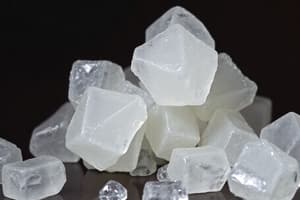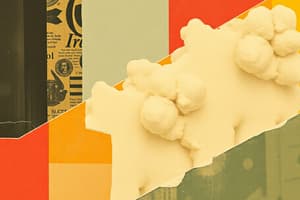Podcast
Questions and Answers
Which type of isomers differ due to the H and OH configuration of carbons 2, 3, or 4?
Which type of isomers differ due to the H and OH configuration of carbons 2, 3, or 4?
- Diastereoisomers
- Enantiomers
- Anomers
- Epimers (correct)
What type of isomers have the same structural formula but different spatial configurations?
What type of isomers have the same structural formula but different spatial configurations?
- Epimers
- Diastereoisomers
- Enantiomers (correct)
- Anomers
In stereochemistry, what is added after cyclisation, leading to the alpha- and beta-configurations of a sugar?
In stereochemistry, what is added after cyclisation, leading to the alpha- and beta-configurations of a sugar?
- Enantiomers
- Epimers
- Anomers (correct)
- Diastereoisomers
Which type of carbohydrate is not an epimer nor an enantiomer?
Which type of carbohydrate is not an epimer nor an enantiomer?
How many asymmetric carbons do the D and L configurations of glyceraldehyde contain?
How many asymmetric carbons do the D and L configurations of glyceraldehyde contain?
What type of isomers have the C-1 in a ring structure as the asymmetric center, resulting in alpha- and beta-configurations?
What type of isomers have the C-1 in a ring structure as the asymmetric center, resulting in alpha- and beta-configurations?
What is the term for every individual monomeric unit of a carbohydrate?
What is the term for every individual monomeric unit of a carbohydrate?
Which of the following is an example of a 5-carbon monosaccharide?
Which of the following is an example of a 5-carbon monosaccharide?
What is the main difference between ketoses and aldoses?
What is the main difference between ketoses and aldoses?
Which type of isomers have no variation in spatial arrangement?
Which type of isomers have no variation in spatial arrangement?
Which pair represents a 5-carbon monosaccharide and its structural isomer?
Which pair represents a 5-carbon monosaccharide and its structural isomer?
How many aldoses and ketoses can be identified among 8 hexose sugars?
How many aldoses and ketoses can be identified among 8 hexose sugars?
What type of group do carbohydrates contain in their structures?
What type of group do carbohydrates contain in their structures?
What is the general classification of carbohydrates based on the number of monomeric units present?
What is the general classification of carbohydrates based on the number of monomeric units present?
Which type of carbohydrate contains an aldehyde or ketone group?
Which type of carbohydrate contains an aldehyde or ketone group?
What distinguishes simple carbohydrates from complex carbohydrates?
What distinguishes simple carbohydrates from complex carbohydrates?
Which of the following is NOT a classification of carbohydrates?
Which of the following is NOT a classification of carbohydrates?
In which classification do we find carbohydrates with two monomeric units present?
In which classification do we find carbohydrates with two monomeric units present?
Flashcards
Epimers
Epimers
Isomers that differ in configuration at a single chiral center.
Enantiomers
Enantiomers
Isomers with the same structural formula but different spatial arrangements.
Anomers
Anomers
Stereoisomers formed upon cyclization where the C-1 carbon becomes chiral, resulting in α and β forms.
D-Galactose and D-mannose
D-Galactose and D-mannose
Signup and view all the flashcards
Asymmetric Carbons in Glyceraldehyde
Asymmetric Carbons in Glyceraldehyde
Signup and view all the flashcards
Anomers
Anomers
Signup and view all the flashcards
Monosaccharide
Monosaccharide
Signup and view all the flashcards
Ribose
Ribose
Signup and view all the flashcards
Aldoses vs. Ketoses
Aldoses vs. Ketoses
Signup and view all the flashcards
Structural Isomers
Structural Isomers
Signup and view all the flashcards
Ribose, Ribulose
Ribose, Ribulose
Signup and view all the flashcards
Hexose Isomers
Hexose Isomers
Signup and view all the flashcards
Functional Groups in Carbohydrates
Functional Groups in Carbohydrates
Signup and view all the flashcards
Carbohydrate Classification
Carbohydrate Classification
Signup and view all the flashcards
Monosaccharides
Monosaccharides
Signup and view all the flashcards
Simple vs. Complex Carbohydrates
Simple vs. Complex Carbohydrates
Signup and view all the flashcards
Triacylglycerols
Triacylglycerols
Signup and view all the flashcards
Disaccharides
Disaccharides
Signup and view all the flashcards
Study Notes
Monosaccharides and Stereoisomers
- Monosaccharides, except dihydroxyacetone, contain 1 or more asymmetric carbons.
- D- and L- configurations of glyceraldehyde have a single asymmetric carbon and are mirror images.
- Epimers are isomers that differ due to the H and OH configuration of carbons 2, 3, or 4.
- Examples of epimers: D-glucose and D-mannose at C-2, and D-glucose and D-galactose at C-4.
- D-glucose and D-galactose are not epimers, but diastereoisomers, since they differ at more than 1 carbon.
Anomers
- Anomers are formed when a ring structure is created, resulting in an additional asymmetric carbon.
- The C-1 in a ring structure can become the asymmetric centre of the ring, resulting in alpha- and beta-configurations of the sugar.
Stereoisomers
- Stereoisomers have the same structural formula but with different spatial configurations.
- Optical activity is influenced by the presence of asymmetric carbons or chirality.
Monosaccharides Classification
- Monosaccharides can be classified into several classes based on the number of carbon atoms present:
- Trioses: 3-carbon monosaccharides
- Tetroses: 4-carbon monosaccharides
- Pentoses: 5-carbon monosaccharides
- Hexoses: 6-carbon monosaccharides
- Heptoses: 7-carbon monosaccharides
Structural Isomerism
- Ketoses are isomers of aldoses, with the same number and kinds of atoms, but different structural or spatial configurations.
- Examples of structural isomers:
- Erythrose (Aldose) and Erythulose (Ketose): 4-carbon monosaccharide
- Ribose and Ribulose: 5-carbon monosaccharide
- Xylose and Xylulose: 5-carbon monosaccharides
Carbohydrates Introduction
- Carbohydrates are essential components of all living organisms.
- Carbohydrates contain an aldehyde (-CHO) or ketone (-C=O) group with two or more hydroxyl (-OH) groups in their structures.
- Examples of carbohydrates: Glyceraldehyde, Dihydroxyacetone, Glucose, Fructose.
Studying That Suits You
Use AI to generate personalized quizzes and flashcards to suit your learning preferences.




